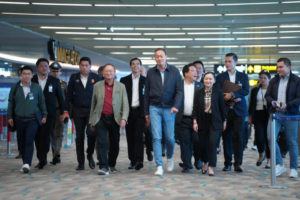
Bangkok Air keen to invest in new airport planned for Phangnga
Bangkok Airways is eager to invest in the new airport planned for Phangnga if the government switches its plan from a public project to a public-private partnership scheme, as the project has high potential to become a new tourism hub in Thailand.
The government is considering building a new airport in Phangnga in an effort to handle the congestion at Phuket airport.
Puttipong Prasarttong-Osoth, president of Bangkok Airways, said the airline is interested in bidding for the project as it could provide a new gateway for many airlines keen to transport passengers directly to southern Thailand.
He said a runway expansion at Phuket airport is not feasible at the moment, so a second airport nearby could help accommodate more flights.
In addition, Phangnga has been recognised as an emerging destination among foreign tourists, said Mr Puttipong.
A feasibility study for the Phangnga airport estimated at 80 billion baht was revived by the Airports of Thailand after Prime Minister Srettha Thavisin visited the province last month and said the new expansion was necessary for tourism.
Mr Puttipong said airport investment could help it gain solid revenue.
The company owns airports in Samui, Sukhothai and Trat, which generate around 2 billion baht in revenue per year for the company.
He said as travel demand continues to grow in the final quarter, Bangkok Airways increased its targets for annual revenue from ticket sales from 15 billion baht to 16 billion, with an average load factor of 78%.
Operational costs have continued to surge following the pandemic, with the average ticket price this year expected to increase by 8% from its previous forecast, from 3,400 baht per flight to 3,643 baht per flight, said Mr Puttipong.
“Operational costs post-pandemic have increased 10-15% for many items and services, such as ground handling at many airports overseas, aircraft maintenance and engine parts,” he said.
Mr Puttipong said Bangkok Airways, as a member of the Airlines Association of Thailand, already submitted its proposal to the government asking for a reduction in excise tax on jet fuel.
The new rate might not be cut to the pandemic level of 0.2 baht per litre, but it should be lower than the present rate of 4.72 baht per litre as jet fuel prices remain high, he said.
Mr Puttipong said the airline plans to resume two flights from its hub in Samui to Chongqing and Chengdu in China in November, which should benefit from the proposed visa exemption policy for the Chinese market during the high season.
However, the airline does not plan to aggressively expand Chinese routes because of sluggish demand, he said.
The recovery rate for capacity among Thai airlines operating on Chinese routes is only 30%, said Mr Puttipong.
He said the airline will be cautious in acquiring more aircraft for its fleet to avoid incurring a heavy cost burden, as seen during the pandemic.
The airline has 26 aircraft, of which 20-21 jets are active. The remainder are awaiting maintenance.
In five years, the airline might have only 30 aircraft, down from 40 prior to the pandemic, said Mr Puttipong.
Instead, the airline will focus on filling its existing capacity with a higher load factor by offering reasonable ticket prices, he said.
Source: https://www.bangkokpost.com/business/general/2644038

